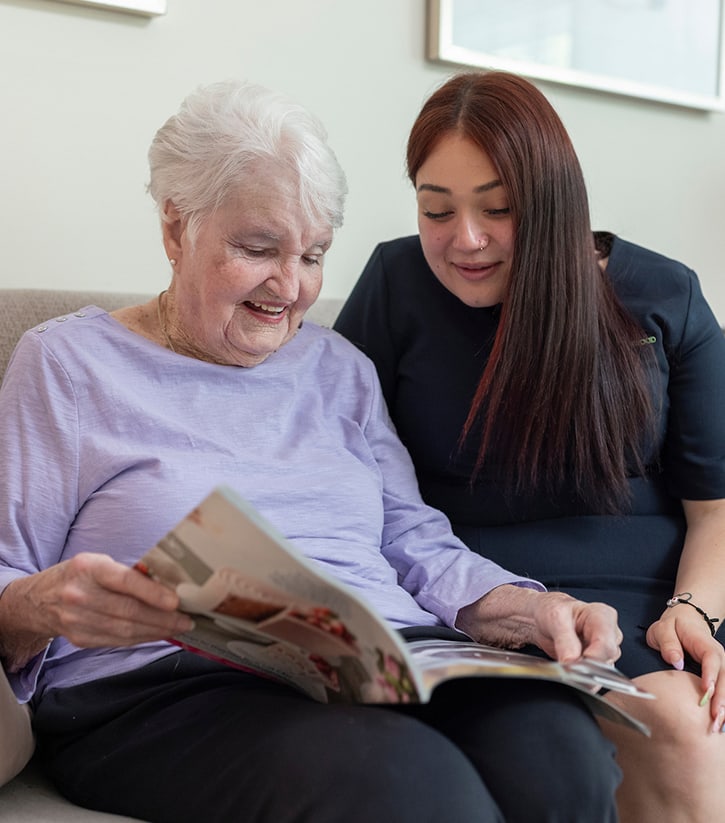Talking to someone with dementia can feel tricky, especially if you’re not sure what might upset or confuse them. Certain phrases, even if said with good intentions, can unintentionally cause frustration or distress.
For example, correcting your loved ones’ memory or questioning their confusion might feel helpful in the moment, but it often leads to more anxiety or frustration. Communicating with someone who has dementia requires patience, empathy, and choosing words that create a sense of comfort and understanding.
If you’re unsure how to approach these conversations, many memory care communities have experienced staff who can offer guidance and support, ensuring your loved one feels understood and valued.
What to Avoid Saying to Someone with Dementia
Words hold power: they can uplift or hurt, reassure or unsettle. For someone navigating the cognitive shifts of dementia, conversations and interactions can feel overwhelming. Everyday questions or offhand remarks might carry unintended implications that can worsen feelings of:
- Frustration
- Anxiety
- Sadness
The first step to positive communication is recognizing that people living with dementia may interpret words differently due to challenges with memory, processing, or perception. What seems like a simple comment to you might not land the same way for them.
Common Phrases That Can Upset Someone with Dementia
Here are some phrases you should avoid and why they may be upsetting:
1. “Don’t You Remember?”
This phrase, while innocent, can shine a spotlight on memory challenges. For someone aware of their difficulty recalling events or details, being reminded of what they don’t remember may feel frustrating or even embarrassing.
2. “You Already Told Me That.”
Hearing this comment can feel dismissive. People living with dementia may repeat themselves because they are unaware they shared the information before. Pointing it out can make them feel self-conscious or uncomfortable.
3. “You’re Wrong.”
Debating facts, correcting details, or pointing out inaccuracies often does more harm than good. The intention to clarify might only cause frustration or distress if your loved one’s understanding doesn’t align with yours.
4. “I Just Told You That.”
Patience is key when someone struggles with memory lapses. Responding with frustration can come off as accusatory and cause the person to withdraw or feel undervalued.
5. “Why Can’t You Just…”
Frustration leads to comments that can come across as critical. Phrases like this imply the person should “do better,” but their brain might not allow it anymore.
6. “It’s Not That Difficult.”
Minimizing challenges can diminish the person’s experience. Tasks that once seemed simple may now require monumental effort, and dismissive comments disregard their genuine struggles.
What to Say Instead: Supporting Someone with Dementia
Positive communication doesn’t require complex strategies, it’s about reframing your words with care and intent. Here’s how you can approach conversations differently to nurture understanding and positivity.
Use Gentle Prompts
Instead of focusing on what your loved one can’t remember, gently guide the conversation. Try, “We had such a beautiful walk yesterday, didn’t we?”
Validate Their Feelings
If your loved one shares something that doesn’t fully align with reality, resist the urge to correct them. Instead, reflect their emotions back to them. For example, “It sounds like that made you really happy!”
Acknowledge & Reassure
If they express frustration, meet them with compassion. Say, “I know this is tough, and I’m here to help.”
Create a Calm Space
When your loved one becomes agitated, use soothing tones and consider redirecting the conversation to something they enjoy. “Why don’t we sit and listen to some music you love?”
Navigating Conversations with Empathy & Care for Dementia
Empathy is your greatest tool when interacting with someone living with dementia. Putting yourself in their shoes helps you understand how they might be feeling.
Remember that, even when words become harder for your loved one to recall, emotions still resonate deeply. Speak in ways that offer reassurance and connection, creating a safe space for them to engage meaningfully.
The Impact of Language: How Words Affect Someone with Dementia
Language has the power to shape experiences. Words that offer encouragement, reassurance, and positivity can elevate someone’s mood, helping them feel seen and valued. On the other hand, insensitive or dismissive language can lead to anxiety, frustration, or withdrawal.
By being conscious of your word choice, tone, and approach, you help foster trust and build a positive environment.
Promoting Positive Communication with a Person Living with Dementia
Communicating positively requires intentionality in your words and actions. Here are a few tips to help foster better conversations:
- Speak slowly and with a calm tone.
- Maintain eye contact to convey attention and respect.
- Avoid slang or overly complex phrasing.
- Be patient and allow time for responses.
Creating a Supportive Environment for Those with Dementia
Beyond conversations, your actions can further support communication success.
- Minimize distractions in the environment
- Keep the atmosphere calm and welcoming
- Provide plenty of non-verbal cues like smiles or gentle touches to indicate care
When caregivers and loved ones approach communication with thoughtfulness, they help alleviate challenges, reduce stress, and encourage moments of joy for someone experiencing dementia.
How to Be Mindful of What You Say to Someone with Dementia
Simple changes in how you speak can rebuild confidence, create peace, and maintain strong connections. By avoiding hurtful phrases, choosing words thoughtfully, and responding with empathy, you’re showing love through language, and opening the door to more meaningful interactions.
It’s not just about saying the right things; it’s about creating an atmosphere of patience, warmth, and understanding. With kindness as your guide, you can ensure every conversation with your loved one makes them feel safe.If you’re looking for more resources or support, contact The Hidenwood at RUI to learn how we can help make a difference for you and your loved ones.














